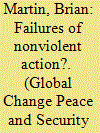| Srl | Item |
| 1 |
ID:
143660


|
|
|
|
|
| Summary/Abstract |
Thomas Richard Davies in his 2014 article ‘The Failure of Strategic Nonviolent Action in Bahrain, Egypt, Libya and Syria’ in Global Change, Peace & Security addresses an important topic.1 As he notes, there are many lessons to be learned from failures of nonviolent struggles, but far more attention is given to successes. Davies analyses the 2011 nonviolent campaigns in four countries, diagnoses four corresponding modes of failure, and argues that in each of them nonviolent action may contribute to its own failure. Specifically, he argues that in Bahrain nonviolent action made resisters vulnerable to repression, in Egypt the nonviolent campaigners' strategy of alignment with the military made subsequent military repression easier, in Libya the repression of nonviolent resisters generated international outrage, making external military intervention easier to justify, and in Syria nonviolent action contributed to splits in the military, encouraging a transition to armed struggle.
|
|
|
|
|
|
|
|
|
|
|
|
|
|
|
|
| 2 |
ID:
090857


|
|
|
|
|
| Publication |
2009.
|
| Summary/Abstract |
Perpetrators of genocide are likely to use a variety of tactics to reduce outrage from their actions. The main sorts of tactics are covering up the actions, devaluing the target, reinterpreting the actions in ways that minimise seriousness and responsibility, using official channels to give an appearance of justice, and using intimidation and bribery. The 1994 Rwandan genocide reveals ample evidence of all these tactics. Critics of genocidal behaviour should expect the use of these tactics and be prepared to counter them. A focus on tactics concerning outrage over genocide is a complement to the usual approaches looking at history, psychology, social dynamics, causes and responsibility.
|
|
|
|
|
|
|
|
|
|
|
|
|
|
|
|
| 3 |
ID:
094362


|
|
|